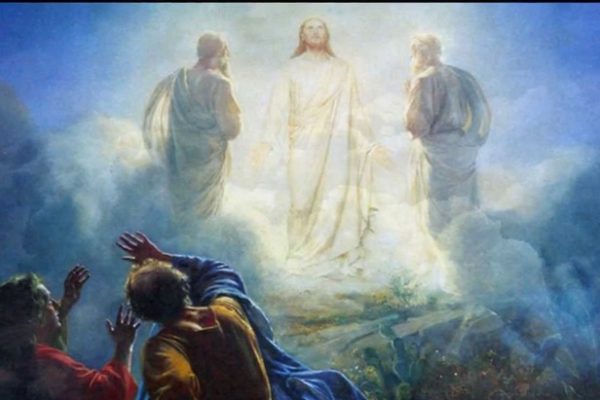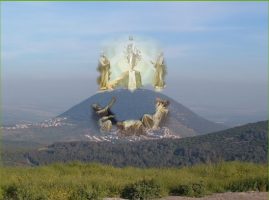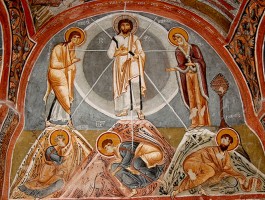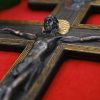Seeing is believing. It is one thing to hear an interesting story or to entertain a bright idea. It is far different, however, to encounter an event or to participate in a situation such that we know its truth and are changed as a result. That is precisely what the apostles Peter, James, and John experienced on Mount Tabor when they were enabled to behold the divine glory of Jesus Christ, Who shone brightly with light as the voice of the Father identified Him as His beloved Son.
St. Peter writes in today’s epistle reading that he did not proclaim “cleverly devised myths” about Christ, for those who beheld the Transfiguration “were eyewitnesses of His majesty.” The gospels make clear that the disciples were not looking for a Messiah Who was truly divine, but for a righteous national leader like King David. Peter famously rejected the Lord’s prediction of His crucifixion and denied Him three times. He was restored as the chief apostle and went to his death as a martyr, not because he had made up stories about a crucified and risen Lord, but because the Savior had revealed Himself to Peter as truly the Son of God. And he surely did not understand the full meaning of the Transfiguration when it occurred, as it was not until after the resurrection that Christ “opened their minds to understand the Scriptures.” (Lk 24:27) Indeed, the Lord said to Peter, James, and John, “Tell no one the vision, until the Son of man is risen from the dead.” It was only from the perspective of the resurrection, which no one anticipated, that the disciples could understand what it meant for Christ to be the Son of God.
The truth revealed at the Transfiguration may not be conveyed simply in words or ideas. It had to be seen, heard, and experienced in a way that made Peter, James, and John participants as whole persons in the divine glory. The Lord graciously opened the eyes of their souls, filling them with the divine energies such that they could catch a glimpse of His holy majesty. He enabled them to hear the voice of the Father, and like Moses before the Burning Bush, they fell on their faces “and were filled with awe.” As is shown by the disappearance of Moses and Elijah, He enabled them to see His superiority to the Law and the Prophets of the Old Testament. They did not simply have thoughts or feelings about Christ; no, they truly experienced Him from the depths of their souls as the Son of God.
The change that occurred that day was not in the Lord Himself, Who is eternally radiant with the divine glory in a way beyond our comprehension. The change was in the disciples, for Christ opened the eyes of their souls to behold His infinite holiness, to the extent that they were able as human beings. If we observe this feast simply by celebrating the doctrinal teaching of Christ’s divinity or the great mystical experience of the apostles, we will have excluded ourselves from the full meaning of this event. For as in all feasts of the Church, the point is not simply to look back at what happened long ago. It is, instead, to enter into the eternal truth that is revealed. And on this great day of the Transfiguration, the only appropriate way to celebrate is to cooperate with the gracious divine energies of our Lord so that we also will behold His divine glory. That means that we too must become transfigured through personal union with the Son of God such that His eternal majesty permeates our existence, making us shine brightly like an iron left in the fire.
As with Peter, who rejected the Lord’s prediction of His death and then denied Him three times, we might well prefer another kind of religion with expectations not quite so high. Shining with the uncreated light may be more than we want to pursue. It may be more appealing to follow an imaginary King David in waging war against those we consider our enemies and to set up a social order that rewards those we think are righteous like ourselves. Maybe we would prefer someone pretending to be Moses or Elijah who would provide instructions that we think good people like us can easily follow on how to live differently from those we like to condemn. Such sentiments are terrible misinterpretations, of course. These Old Testament saints never pointed to some easy kind of self-serving religion, but were misinterpreted in first-century Palestine by those who worshiped an earthly kingdom or their own self-righteousness. If we go down that path, we will end up repudiating Christ as surely as did those idolaters.
The only fitting way to celebrate the Transfiguration is by embracing as fully as possible the countless opportunities that we have to grow in holiness as we open the eyes of our souls to participate in the glory of God by grace. I have a warning for you, however. If the thought ever occurs to you, “Gosh, I’m becoming really holy now,” pay it no attention at all and instead say the Jesus Prayer or at least focus your mind on something other than your own deluded thoughts until it goes away. The more transfigured we are in holiness, the more aware we will be of our sinfulness and the infinite distance between our current spiritual state and the perfection to which our Lord calls us. The path to shining with light begins with a humble, honest acceptance of the darkness in our lives. The path also continues along that route. That is precisely why we need to be transfigured so that we, who are filled with darkness, will become radiant with the brilliant light of the Lord. But we must be prepared: the more you step into His light, the more obvious the spots of darkness will be. The better focused the eyes of our souls are, the more we will be aware of our need for His healing and strength.
A very common temptation, then, is to give up. Why pray, when our minds wander? Why fast, when we become obsessed with food? Why come to Confession, when we fall right back into our familiar sins? Why try to do anything pleasing to God, when it does not give us what we want? Well, that is the problem. As long as we think about getting the spiritual results that we want on our schedule and in our own way, we will not be transfigured in holiness. We will, instead, remain captive to some form of idolatrous spiritual pride that will blind us to the truth of where stand before the Lord.
If we want to enter into the joy of this great feast of our salvation, we must persistently walk into the light by opening the eyes of our souls to the blinding glory of our Savior. We will often not like what we see in ourselves as a result, but by stumbling forward as best we can, constantly calling out for His mercy, the Lord will change, strengthen, and purify us. In ways that we cannot yet understand, He will make us “a lamp shining in a dark place” that gives light and hope to a world that so desperately needs to be healed by union with His gracious divine energies. The message of this feast is not to lose heart, but to press on in faithfulness. For the darkness is simply the absence of light and a sign that we have yet more room to embrace the blessed life of Christ.
We celebrate the Transfiguration of our Lord already knowing of His resurrection, by which He has illumined even the tomb. Let this sink in: There is no darkness in our souls or in our world that our crucified and risen Lord cannot make radiant with His gracious divine energies. We must, however, do our part by opening the darkness in our lives to His healing light. Even as we stumble and fall, we must continue to do so with abiding trust in His mercy for blind sinners such as ourselves. For though we do not yet have the eyes to see it, that is how our gracious Lord will make us shine with holy light for our salvation and that of the entire world. Let us join St. Peter, then, in living as “eyewitnesses of His majesty.” For seeing is believing.



















